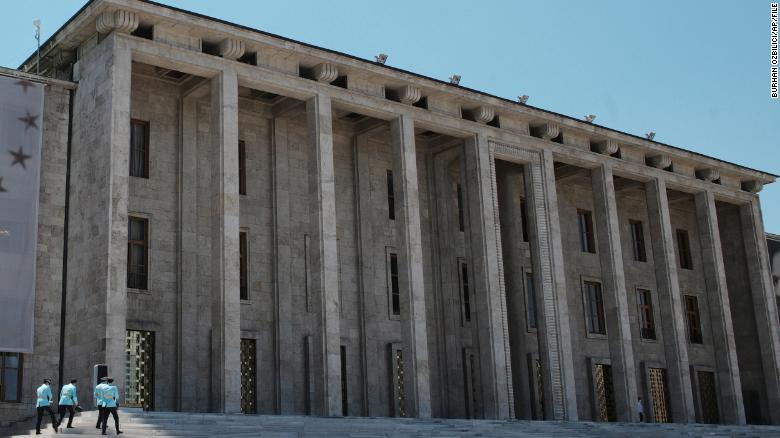By Isil Sariyuce and Caitlin Hu, CNN
Updated 7:11 AM ET, Thu October 7, 2021

Presidential honor guard officers walk as Turkey's President Recep Tayyip Erdogan attends a ceremony at the parliament in capital, Ankara, on July 15, 2021.
Istanbul (CNN)Turkey became the last G20 nation to ratify the Paris climate agreement on Wednesday, almost six years after initially signing it, but at the same time, lawmakers protested a key detail -- the country's classification as a developed nation.
Turkish environment and urbanization minister Murat Kurum said Wednesday that lawmakers had voted unanimously in favor of ratifying the agreement, just weeks before world leaders convene in the Scottish city of Glasgow for crucial talks on climate.
Kurum said on Twitter that he hoped the decision would help the country achieve net zero by 2053. Net zero is where the amount of greenhouse gases emitted is no greater than the amount removed from the atmosphere.
The Paris Agreement, adopted by nearly 200 nations, commits participants to keep global warming below 2 degrees Celsius above pre-industrial levels and, if possible, below 1.5 degrees. Each country is responsible for developing its own plan for achieving those goals.

What is COP26? How the pivotal UN conference could avert global climate 'catastrophe'
Turkey was one of just a handful of signatory countries that had not yet ratified the pact. It had held out for years because the government opposed Turkey being listed under Annex I -- a category for industrialized nations -- which means the country is obliged to do more on climate than developing nations.
While lawmakers backed the Paris Agreement -- which calls Turkey an industrialized nation -- they also adopted a statement saying they were ratifying the deal as a developing country, and would only implement it if it did not "harm its right to economic and social development."
Ümit Şahin, coordinator of Climate Change Studies at Istanbul Policy Center, said that the Paris Agreement did not allow for any such conditions to be imposed on it. That means the statement is essentially symbolic.
"The countries can always give a statement within their right of being a sovereign state, but this does not change the fact that Turkey signed it as an Annex I country," he said.
"This is climate politics and diplomacy, but does not change the fact that Turkey ratified Paris."
Turkish President Recep Tayyip Erdogan announced last month at the United Nations General Assembly in New York that he would submit the agreement to parliament and called for more accountability from the world's most developed nations, which are historically the greatest contributors to global carbon emissions.
"Whoever has done the most damage to nature, to our atmosphere, our water, our soil and the earth, and whoever has wildly exploited natural resources, should also make the greatest contribution to the fight against climate change," he said.
"Unlike the past, this time no one can afford the luxury to say, 'I'm powerful so I will not pay the bill.'"
Local climate activism groups and business chambers were supporting Turkey's ratification ahead of the COP 26 climate summit in Glasgow, Scotland, in early November.
CNN's Isil Sariyuce reported from Istanbul and Caitlin Hu reported and wrote from New York.
No comments:
Post a Comment